Brookside House
In 1838 the Canton arrived in Adelaide with the Scott family from Liverpool. Also on board were William Scott’s sister and her husband David Wylie. The two families requested, and were granted, two adjoining blocks in the original sections, in the Hundred of Adelaide, as laid out by Colonel Light. Section 273 was granted to David Wylie and section 274 was granted to William Scott.1 William Scott built a home on the 80 acre section and named it “Brookside” His sister and her husband, built a school on their section. They named their property “Tranmere” meaning “across the sea” – after Tranmere, Birkenhead, England, were they had lived.2
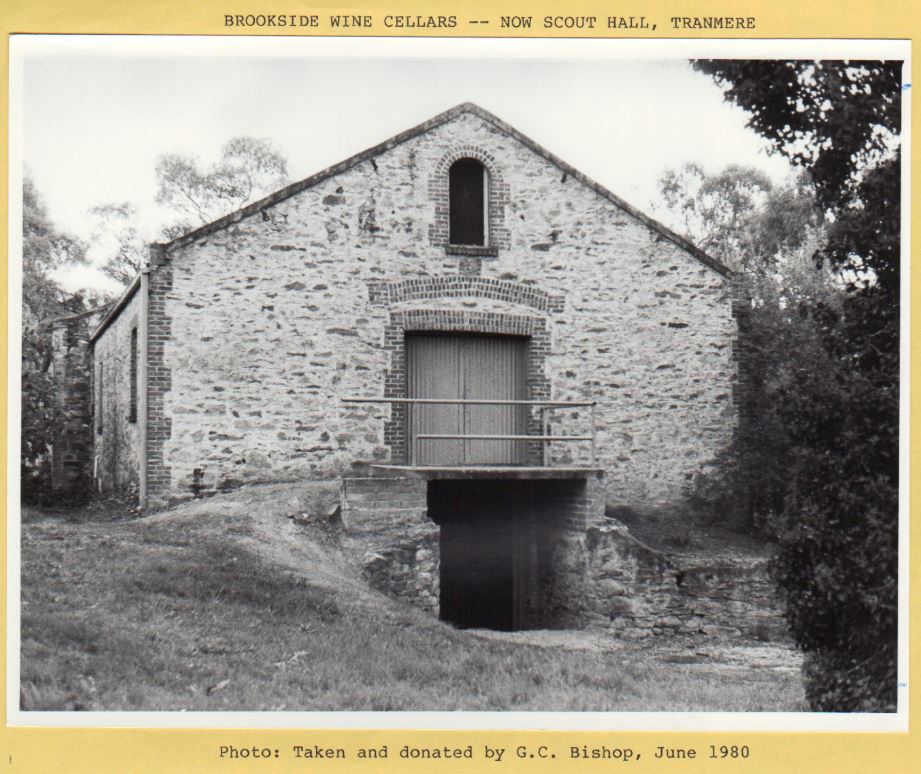
William Scott was an elder and a regular lay preacher in the Scotch Baptist Church, which in the 1840’s met in Hindley Street. Later in 1858 he was a member of the Magill Baptist Church at Gladstone Avenue Magill. In the early years William Scott farmed his land at Brookside. Then he became a shipping agent at Port Adelaide, in the company of Scott & Little. As he became better known at Port Adelaide, he was appointed a “brother” of Trinity House Board, which later became the Marine Board. In 1853 he was elected to the South Australian Legislative Council in the seat of Port Adelaide.3 He remained in Parliament until his resignation in 1863. During his time in politics he often entertained persons of state at Brookside. He died in his home on January 2nd 1866. As a mark of respect, the ships then in Port Adelaide at the time of his death lowered their flags to half mast.4 He is buried in the family vault, in the West Terrace cemetery, near to his friend the Rev. T.Q. Stow. He left a wife and eight children. His eldest child was Jane Margaret Scott.
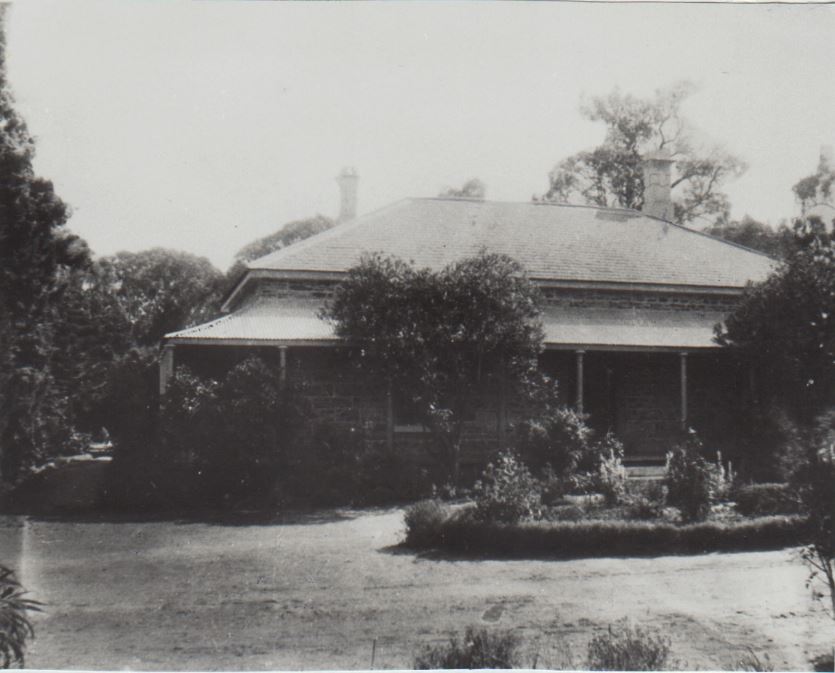 Brookside home [B 25732] - Photographed about 1910 - State Library of South Australia
Brookside home [B 25732] - Photographed about 1910 - State Library of South Australia
http://collections.slsa.sa.gov.au/resource/B+25732
The site of the house at Brookside was on the northern side of Shakespeare Avenue where it enters The Gums Reserve. The house was demolished in 1983.
She was married to Joseph Herbert Thornley, a manager with the Bank of South Australia. He managed the Victor Harbour, Goolwa and Gawler branches.5 He was also an Anglican Synod Custodian of the Seal member and also a member of the Board of Advice for Gawler district schools.6 William David Scott was the eldest son he was a Master of the Supreme Court. In 1854 when a ship’s Captain was charged overtime, because he asked for clearance papers, after office hours (4 pm.) The Captain was represented in court by W.D. Scott. He opposed the Collector of Customs for Port Adelaide, and won the case.7 Another victorious court case was during a council election at Port Adelaide. Two prospective councillors who were left off the ballot paper wanted the election declared null and void. Even though his brother had been elected in that ballot, he represented the two aggrieved gentlemen, and won the case.8
David Wylie Scott was the second eldest son. He married Margaret Cochrane Little, the daughter of his father’s business partner in Scott & Little. He became the editor of the Port Adelaide News. His wife was a noted artist of flowers and her paintings were sold all over the world. The Duchess of York (later to become Queen Mary) owned one.
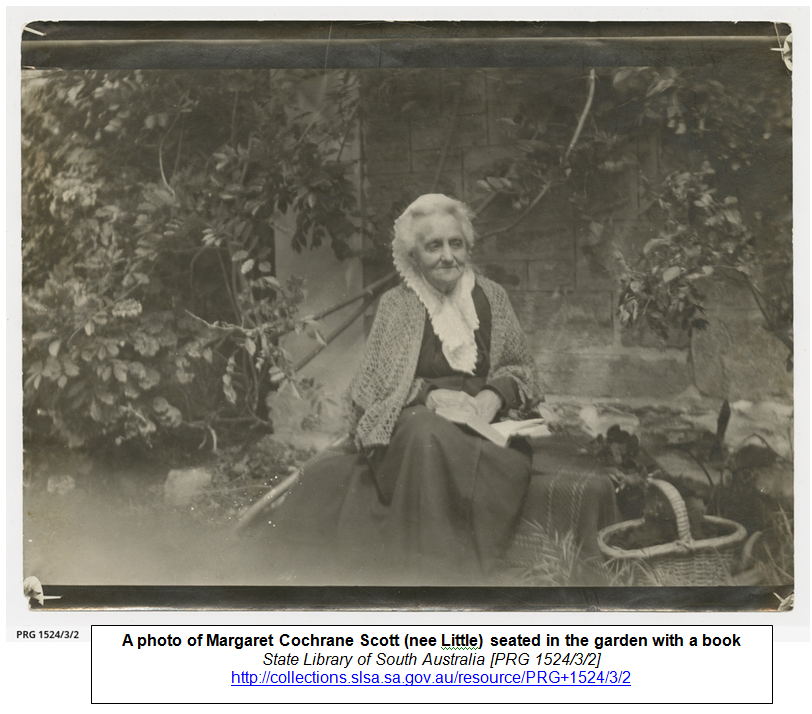
David Wylie Scott died at Brookside on December 2nd 1887. He died on the morning of a fundraising fete to be held in the gardens at Brookside. The press stated it was a poor attendance, due in part to the death, in part to the wet weather and in part to a garden party being held at Government House on the same morning.9 After the death of his father Robert John Scott looked after the property. He was a Captain in the first Adelaide rifles. The Shiraz wine from the Brookside vineyard won great praise at a tasting in France.10 They also won a medal at the Victorian Exhibition in 1867.11 Robert John Scott was convicted of indecent exposure in 1885. His counsel pleaded insanity and he was sent to the Parkside Asylum.12 The vineyard was leased by his business partner J. Taylor Holmes. Mary Wylie Scott was the second daughter and she married Luigi Holmann Savrini a noted bass singer.13 The youngest son James Cochrane Scott married Annie Vincent Burns. Annie was the Granddaughter of Robert Burns the great Scottish poet. They established mission services at Largs Bay. The youngest of the family was Janet Jamieson Scott. She died at Largs Bay in 1923 aged 82 years.
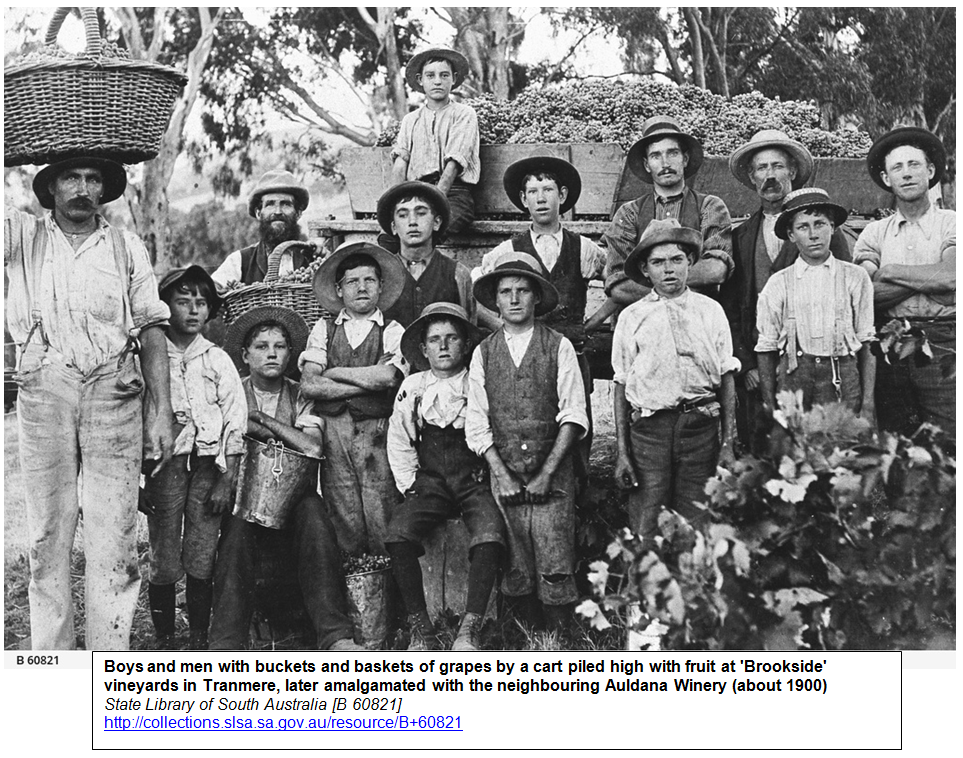
Joseph Salvatori Guidi
Brookside was purchased by Joseph Salvatori Guidi in the 1920’s. Joseph was a successful business man from Broken Hill. He was originally a painter and decorator and sign writer. Success in business led him to own a number of properties. At one time he was chairman of the Gas Company. In his early days he was interested in sport and the theatre. This love for the theatre was responsible in his building of the Tivoli Theatre in Broken Hill.14 His idea was to bring live theatre to the town. He realised that with changing taste, plus the high cost of transporting performers, it may not pay its way.15 The change in taste that he noted was for the moving pictures or cinema as we now call it. So he decided to show movies at his Tivoli Theatre. As there were three other movie theatres in town, they were not happy with a fourth. So the competition opposed the granting of a licence to him. He took them to court and lost his case.16 The Barrier Industrial Council and the Labour Party in Broken Hill gave the opposition 24 hours to withdraw their refusal to allow a licence. When they did not the people of the town were advised not to go to the three existing cinemas, and also staff in those cinemas were withdrawn by the unions.17 A judge sent from Adelaide to sort out the problem, remarked this was blackmail. The locals replied “No this is Broken Hill”18 Meanwhile Joseph had set up a stable and stud at Brookside for trotting horses. Life wasn’t always easy for Joseph Guidi. His stables at Brookside suffered two fires in a month.19
His rental properties in Broken Hill also suffered fires. Mr Guidi spent his time between Broken Hill and Brookside in Tranmere. As well as fires Joseph also had foals stolen from his stud. In 1938 a Colt Breaker was sentenced for stealing two colts and a trotting jinker.20 Joseph died in 1944 aged 77 years. He had no immediate family so his wealth was split between various charities. Even after his death Joseph was able to cause concern. The executors of his estate tried to sue a trainer at the stud for stealing a colt called “Ugly.” The court case was ugly too but the judge eventually found that the trainer had been given the colt by Mr Guidi. Further problems for the executors were the charities that Joseph had named to receive bequests from his estate. Some of the nominated charities no longer existed and others could not be confirmed as the names on the will did not correspond to charities in Broken Hill. There was no Broken Hill Orphanage, but there was a St. Anne’s Home of Compassion. Also as far as the executors knew there was no Church Of England Orphanage.21 So even after he had shuffled off this mortal coil, Joseph Salvatori Guidi was causing people to work hard to carry out his final requests. The trustees were able eventually, to carry out the terms of the will, as near as they were able. One would have to think they earned their fees, whatever they were.
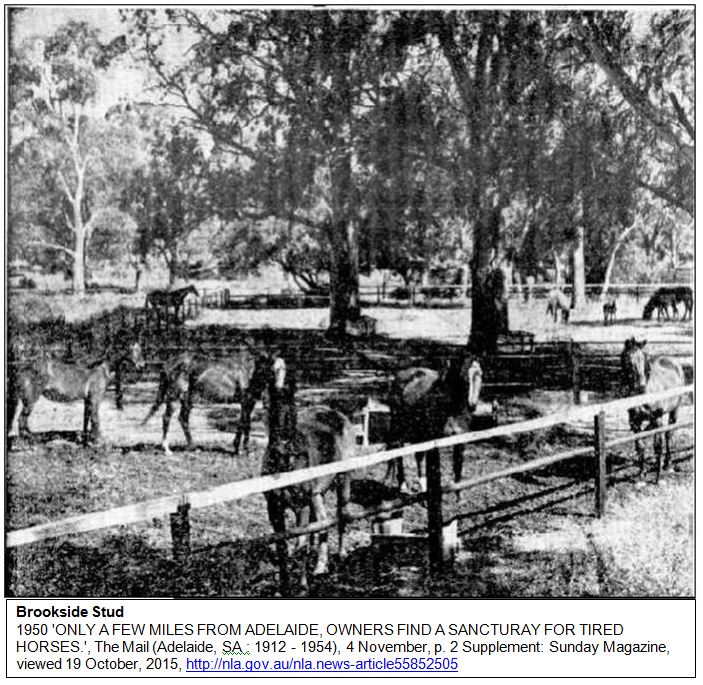
Researched and written by Jim Nelson, volunteer with the Campbelltown Library “Digital Diggers” group.
If you have any comments or questions regarding the information in this local history article, please contact the Local History officer on 8366 9357 or hthiselton@campbelltown.sa.gov.au
- Campbelltown 1868-1968 by John T. Leaney p 32
- Campbelltown 1868-1968 by John T. Leaney p 69
- https://en.wikipedia.org/wiki/William_Scott
- The South Australian Advertiser (Adelaide, SA : 1858 - 1889) Saturday 27 January 1866 p 6
- Adelaide Observer (SA : 1843 - 1904) Saturday 27 January 1872 p 7
- Evening Journal (Adelaide, SA : 1869 - 1912) Friday 18 June 1880 p 2
- South Australian Register (Adelaide, SA : 1839 - 1900) Saturday 1 April 1854 p 3
- South Australian Chronicle and Weekly Mail (Adelaide, SA : 1868 - 1881) Saturday 25 July 1868 p 14
- South Australian Register (Adelaide, SA : 1839 - 1900) Monday 5 December 1887 p 7
- The South Australian Advertiser (Adelaide, SA : 1858 - 1889) Friday 27 March 1868 p 2
- South Australian Register (Adelaide, SA : 1839 - 1900) Saturday 1 June 1867 p 3
- Advertiser 11th June 1885 page 7
- South Australian Register (Adelaide, SA : 1839 - 1900) Saturday 19 January 1884 p 2
- Barrier Daily Truth (Broken Hill, NSW : 1908; 1941 - 1954) Monday 5 June 1944 p 2
- Barrier Miner (Broken Hill, NSW : 1888 - 1954) Wednesday 4 June 1941 p 3
- Recorder (Port Pirie, SA : 1919 - 1954) Wednesday 31 December 1941 p 3
- The Mail (Adelaide, SA : 1912 - 1954) Saturday 4 September 1943 p 2
- The Mail (Adelaide, SA : 1912 - 1954) Saturday 4 September 1943 p 2
- Barrier Miner (Broken Hill, NSW : 1888 - 1954) Saturday 20 November 1943 p 7
- News (Adelaide, SA : 1923 - 1954) Thursday 8 September 1938p 4
- Barrier Miner (Broken Hill, NSW : 1888 - 1954) Thursday 20 May 1948 p 1
